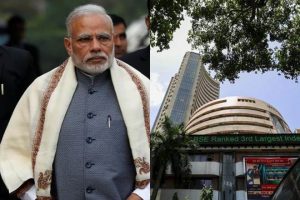Indian financial markets are riding high on the back of Prime Minister Narendra Modi elections, policy and reforms based on that Indian stock market alone has the potential to raise $100 billion a year which will help tremendously in funding country’s funding needs. Indian oldest and top bourse Bombay Stock Exchange said that they are expected to raise $30 billion this financial year through exchange alone. As per the reports Indian capital markets has huge potential to contribute more than $2 trillion funding over the next ten years for building infrastructure, setting up and expanding new businesses, job creation which will boost India’s growth story. India todays need robust investment and policy framework to boost economy growth.
Indian markets can raise $100 bn. a year, says BSE CEO Ashish Chauhan on backing of Global Funds can be used to drive India’s Success Story. As in an interview to Press trust of India BSE, CEO, Ashish Chauhan said that it is a realistic target and completely achievable given that India has higher saving rate. Only the thing which needs to be done is to channelize these savings into financial market instruments.Mr. Chauhan said the debt market in India would need to play a much larger role than equities, which was the case globally, for such high levels of fund raising activities, while he asserted that the necessary infrastructure and technology is there already in place for meeting these targets.The chief executive officer of Asia’s oldest stock exchange, who recently steered a highly successful initial public offering of the exchange that had been pending for close to a decade, said one of the biggest functions for the markets is capital formation.
Further, 10 – 15 companies are in the pipeline to be listed domestically in 2017, raising $5.86 billion. This includes Vodafone’s highly anticipated $3 billion initial share-sale plan, which could potentially surpass the state-run Coal India’s IPO to become the country’s biggest public issue. The report said that momentum in the Indian IPO market continues to build, boosted by Prime Minister Narendra Modi’s drive to improve ease of doing business. These efforts include rationalisation of the tax regime.
“The GST Bill will not only bring about the immediate benefit of widening the country’s tax base and improving the revenue productivity of domestic indirect taxes, but more importantly, it sends the message to the people of India and rest of the world that Indian government is committed to economic reform, further bolstering country’s attractiveness as an investment destination,
Domestic listings continue to dominate India’s IPO scene. Dual listing on both exchanges – BSE and NSE – accounted 98.8 per cent of companies listings by value in 2016 to date, raising more than $3 billion from 19 IPOs, including ICICI Prudential Life Insurance’s $909 million IPO, which is the country’s biggest IPO last year. Among the 22 IPOs in the 2016 last year, Strand Life Sciences’ listing on Nasdaq, which if goes ahead, will be country’s first cross-border IPO after Videocon d2h.
Improved business confidence is also driving Indian companies to look at growth and market expansion opportunities overseas by way of cross-border IPOs. This provides a means to access risk capital that is not available in India, and also to connect with investors who better understand and appreciate their businesses.The trend of IPO activity is likely to continue for the rest of 2017 and well into 2018, driven by upbeat economic sentiment, improved business confidence, easing inflationary pressure and stable foreign direct investment inflows. All this factors has also led strong
